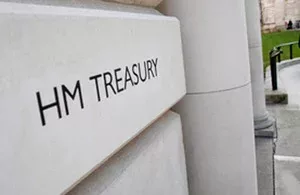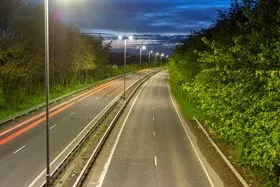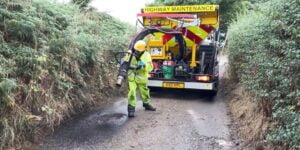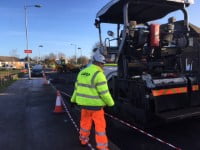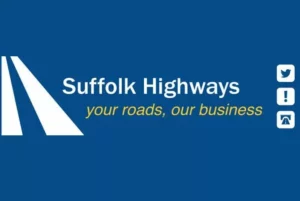A five-year, £5.7 billion funding investment for City Region Sustainable Transport Settlements was confirmed in yesterday’s Budget, to fund projects such as the Sheffield Supertram renewal and the Wednesbury to Brierley Hill metro extension in the West Midlands.
But there was a £24 billion announced for strategic roads investment from 2020 to 2025, less than the £27.4bn announced last year.
Also, £2.7 billion over the next 3 years for local roads maintenance in places not receiving City
Region Settlements – but it is unclear at this stage whether this is more or less money compared to the previous three years and indeed whether it is inline with business case presented by the UKRLG / ADEPT Asset Management Board (UKAMB) and its expectations of what certain levels of funding would enable the sector to achieve on the network.
On top of this, £2.6 billion from 2020-2025 to deliver a long-term pipeline of over 50 vital local road
upgrades including the A509 Isham Bypass, A259 Bognor Regis and A350 Chippenham
Bypass which will progress to the next stage of development.
There was £23 million of new funding in anticipation of the final recommendations of Sir Peter Hendy’s Union Connectivity Review. This will build on the existing £20 million union connectivity development fund and broader transport investment to improve UK-wide connectivity.
The government will also invest over £5 billion in buses and cycling during this Parliament. SR21 delivers a step change in investment, delivering the commitments in Bus Back Better and Gear Change.
This will include: over £3 billion of bus investment across the Parliament, including £1.2 billion new funding
for bus transformation deals to deliver London-style improvements in fares, services and infrastructure. It also confirms a further £355 million of new funding for zero emission buses, and an allocation of £70 million Zero Emission Bus funding to deliver buses and related infrastructure in Warrington, Leicester, Milton Keynes, Kent, and Cambridgeshire
& Peterborough. This builds on significant zero emission and bus recovery funding, a reformed Bus Service Operators Grant, and funding for new schemes through City Region Settlements.
The government also confirmed that more than £2 billion of investment in cycling and walking over the Parliament, including £710 million of new active travel funding at SR21. This funding will build hundreds of miles of high quality, segregated cycle lanes, provide cycle training for every child and deliver an e-bike support programme to make cycling more accessible.
There will also be £620 million of additional investment to support the transition to electric vehicles, on top of the £1.9 billion committed at SR20. This new funding will be spent on public chargepoints in residential areas and targeted plug-in vehicle grants, and £180 million to support the development of sustainable aviation fuel (SAF) plants and a SAF testing and certification centre.
Also, £300 million will be provided for R&D programmes to help commercialise low and zero emission
technologies, including trials of three zero emission HGV technologies on UK roads and a multi-year clean maritime demonstration competition.
There is also significant investment for the rail sector.
Sarah Mitchell, Cycling UK CEO, in initial reaction to the government’s Budget announcement that there would be £2 billion ring-fenced for cycling and walking, said:
“Ring-fenced funding of £2 billion over five years will enable councils to get on with building hundreds of miles of separated cycling routes in both urban and rural areas. However it won’t deliver the tens of thousands of miles needed to create the ‘world class’ network that the government promised in its ‘Gear Change’ vision document last year.
“Meeting the government’s own targets to double cycling and increase walking by 2025 will require investment of between £6 and £8 billion. If England is to have a chance of making this target, local authorities must be able to make up the shortfall and secure additional funding if we’re to ‘build back better’.“
The Road Safety Markings Association (RSMA) today welcomes the commitment in the Chancellor’s Budget to invest in cycling infrastructure and local roads in England.
However, more must be done to ensure that work on local networks is being completed by National Highways Sector Scheme #7 (NHSS #7) accredited road marking contractors.
NHSS #7 ensures that road marking contractors operate to the optimum level of professionalism, giving Local Authorities the confidence that their requirements are being fulfilled to the highest standards in a safe environment. A move away from ‘cheapest’ to ‘best value for money’ is the only way that this investment will have positive lasting effects across the local roads network.
Stu McInroy, CEO of the RSMA, said: “Now is the time for Local Authorities to mandate within their contracts that road marking contractors working on their networks are certified to NHSS#7 standard by a UKAS accredited body. It is incumbent upon Local Authorities to spend this investment wisely on behalf of road users and this is achieved by employing only road marking contractors certified to the appropriate standard.
“Professionally installed and maintained road markings will establish consistency and longevity of infrastructure across the local roads network and ensure that the safety of the road users and road workers remains paramount.”
The Go-Ahead Group, Britain’s largest operator of electric buses, welcomes news of additional funding for transport schemes in the Autumn Budget but urges a clear roadmap for decarbonisation of the national bus fleet.
Martin Dean, Managing Director, Business Development at The Go-Ahead Group, said: “Buses are a green mode of transport and with COP26 looming, we’re glad that the Government is committing more funding to electric vehicles.
“But to make the transition to low-carbon buses financially sustainable, the industry needs to sell more tickets. More bus lanes and bus priority schemes are vital in improving frequencies and speeding up journey times, which will encourage people to leave their cars at home.
“This is a once in a generation shift in transport technology – and that means a clear long-term roadmap is needed for decarbonisation of the national bus fleet.”



